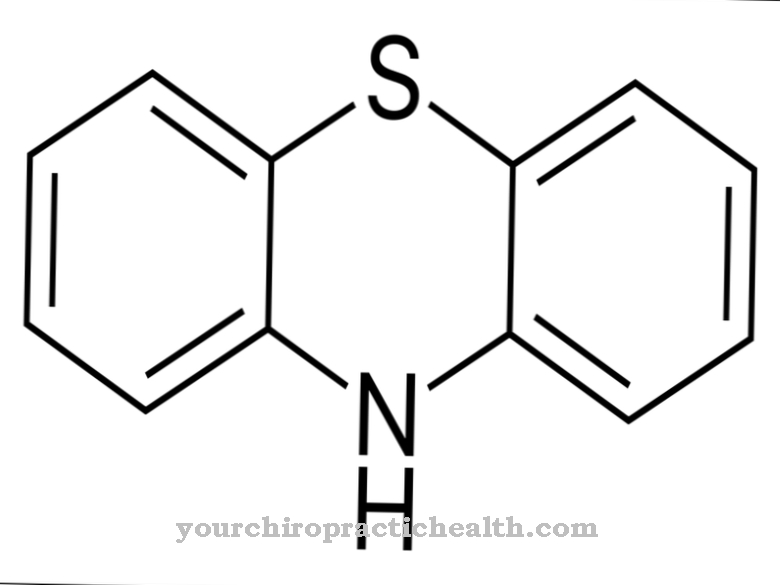Selegelin is a drug from the class of monoamine oxidase inhibitors (MAO-B inhibitors). The anti-Parkinson drug inhibits the breakdown of dopamine in the brain.
What is Selegelin?

Selegelin is used to treat Parkinson's disease. Due to its short half-life and the associated weak effect, it is usually administered in combination with the drug levodopa. It can also be used as a monotherapeutic for milder disease processes. In the USA, the active ingredient is also used to treat depression.
Selegelin is a so-called MAO-B inhibitor. It inhibits the enzyme monoamine oxidase B. The drug was discovered by the chemist József Knoll. The production of selegelin requires a multi-step synthesis. This is based on (RS) -methamphetamine.
Pharmacological effect
Parkinson's disease is caused by the death of special nerve cells in the substantia nigra. These nerve cells usually release dopamine. When the dopamine-releasing nerve cells go under, there is a dopamine deficiency. Why the cells perish has not yet been clarified.
Dopamine is a neurotransmitter that is required for the correct execution of movement sequences. The body can compensate for the dopamine deficiency for a long time. The first symptoms only appear when 60 percent of the dopamine-producing nerve cells have died.
In order to slow the progression of the disease and to alleviate the symptoms of the disease, the patients receive dopamine in the form of the precursor L-dopa. Since the dopamine, which is formed from L-Dopa, is broken down by the enzyme monoamine oxidase B in the synaptic gap between the nerve cells, this enzyme must be inhibited. Otherwise the dopamine supplied cannot develop its effect at the target location. Selegelin is one such monoamine oxidase B inhibitor. It ensures an irreversible inhibition of MAO-B. As a result, the dopamine remains in the synaptic gap longer and can therefore develop its full effect in the central nervous system.
Medical application & use
Selegelin is approved as a monotherapeutic agent for the treatment of the early stages of Parkinson's disease. In combination with the drug levodopa, Selegelin is used for the symptomatic therapy of Parkinson's disease. The drug is mainly administered to patients with a so-called fluctuating clinical picture. This is expressed, for example, by the on-off phenomenon. The patient experiences a sudden change from normal mobility to complete inability to move. Another sign of a fluctuating clinical picture are end-of-dose akinesia. These fluctuations in mobility can occur after prolonged use of L-Dopa. The movement disorders are caused by a decrease in the effectiveness of the medication. Selegelin can reduce these fluctuations.
In the United States, selegelin is prescribed to treat depression. In Germany, the drug is not approved for this indication. For a time, Selegelin was also given to Alzheimer's patients. However, meta-analyzes showed that the symptoms did not improve with the use of selegelin.
You can find your medication here
➔ Medicines to calm down and strengthen nervesRisks & side effects
Common side effects of Selegelin are dry mouth, dizziness, and trouble sleeping. Loss of appetite, confusion, and low blood pressure can also occur. In severe cases, people suffer from hallucinations and anxiety.
Another possible side effect of selegelin is irregular heartbeat. These are noticeable as a heartbeat that is too fast, a heart rate that is too slow or a heart palpitations.
Selegelin may increase the effects and also the side effects of psychostimulants, certain nasal drops, anti-hypertensive agents, anti-hypertensive agents, sedatives, and ethanol. Linezolid, an antibiotic, has MAO-inhibiting side effects. These can also be strengthened by Selegelin, so that there can be an excess of dopamine. Excess dopamine can lead to anxiety and schizophrenia.
Simultaneous use of selegelin and antidepressants is counterproductive. A combination of the drugs can lead to overheating, seizures, mental disorders and cardiovascular problems. In the worst case, it can lead to a coma. In particular, selective serotonin reuptake inhibitors (SSRIs) and fluoxetine must not be taken with selegelin.
Medicinal substances that are broken down via monoamine oxidases remain in the blood longer if selegelin is taken at the same time. When taking selegelin and foods containing tyramine, such as cheese or red wine, in combination, no undesirable effects are to be expected. Due to the MAO selectivity, there is still enough monoamine oxidase A available for the breakdown of the amino acid.














.jpg)













